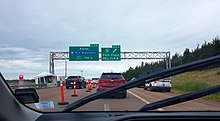COVID-19 pandemic in Nova Scotia
[9] On March 31, it was reported that cases had been identified in four staff members and two residents of long-term care facilities for seniors.
[16] May 1, 2021, marked a record-breaking 148 new cases of COVID-19 in Nova Scotia, breaking the previous record of 96, with 30 people in hospital and 5 in the ICU.
[19] November 17, 2021, pastor Robert Smith of the Gospel Light Baptist Church in Amherst was fined $2,422 for a religious gathering that happened between October 25 and 29 in violation of COVID-19 restrictions under the Health Protection Act.
[20] The gathering is believed to be responsible for an outbreak of COVID-19 in the Northern and Western health zones which lead to the transmission of the virus among residents of the East Cumberland Lodge, a long-term care home in Amherst.
On December 3, 2021, St. Francis Xavier University held its annual X-Ring ceremony with thousands of people attending.
Nova Scotia's premier Tim Houston announced on December 17, 2021, that the university and their Students' Union have both been issued summary offence tickets and fined $11,622.50 each; the maximum amount that can be handed out.
[23] On March 6, the provincial government announced that preparations for the virus were "well underway," including the implementation of a patient screening process for healthcare workers, monitoring and investigation of potential cases, application of public health and infection control measures, and work with the Nova Scotia's Emergency Management Office.
[25] On March 13, all Nova Scotia public sector employees who travelled outside Canada were required to self-isolate for 14 days upon return.
[28] Additionally, Nova Scotia prisons were closed to volunteer organizations, and inmates were limited to non-contact visitation by family and friends, meaning separation by a pane of glass and communication via a phone line.
[30] Additionally, long-term care facilities were closed to visitors, public schools were shut for two weeks from March 23 following March Break (subject to reassessment and extension), day cares were closed, March Break camps were cancelled, casinos were closed, bar owners were no longer allowed to operate video lottery terminals (VLTs), everyone who travelled outside Canada was asked to self-isolate regardless of the development of symptoms, social distancing of two metres was recommended, and gatherings were restricted to 150 "or much smaller if possible.
"[1] Further, all visitation to prisons was suspended and lawyers were asked to arrange alternative means of maintaining contact with clients.
[3] Additionally, the government of Nova Scotia issued a warning about ongoing investment scams, with individuals impersonating banks over the phone.
Doctors and pharmacists were granted expanded options for virtual care using telephone and video conference, pharmacists were allowed to renew prescriptions for most medications, employers were no longer allowed to require a doctor's note from employees seeking to take time off work, nurses were called from retirement to staff the 811 hotline, and service providers funded through the Department of Community Services' Disability Support Program were shuttered.
[36] On March 19, Premier Stephen McNeil announced the allocation of $2.2 million for an increase of $50 to every individual and family member on income assistance, $1 million to the Feed Nova Scotia food bank, a three-month suspension of evictions, emergency funding of $230,000 for Senior Safety Programs and Community Links, as well as an order for university students still living in residence to go home, and for those university students unable to return home to practice social distancing.
[37] On March 20, the provincial government announced an allocation of $161 million for cash flow and credit access for small and medium Nova Scotia businesses.
[38] On March 21, a number of health measures were announced, including the restriction of visitors to hospitals and the opening of new assessment centres, of which there 14 at the time.
In accordance with the emergency declaration, land sea, and air points of entry were tightened, with anyone entering the province stopped, questioned, and told to self-isolate for 14 days, starting March 23.
[6] On March 24, a series of new public health measures were announced, including the testing of all close contacts of positive cases, doubled lab capacity for viral testing, increased capacity for the 811 hotline, enhancement of infectious disease control measures in hospitals, restriction of regulated health professions to virtual care except for emergency or urgent cases, all non-regulated health professions closed, and the reopening of Access Nova Scotia Centres and Registry of Motor Vehicle Offices on a limited, reduced contact basis.
[42] On March 30, the provincial government released a more comprehensive plan for how schools will proceed through the coronavirus pandemic, as well as an online tool for businesses.
[43] On March 31, the provincial government announced that a map will be released in the near future online showing where cases are located across the province organized by the four health zones.
[50] On May 15, the province of Nova Scotia announced a further easing of restrictions, with "archery, equestrianism, golf, paddling, sailing/boating and tennis" allowed to resume, as well as the reopening of public beaches.
In June 2020, the Premier of Prince Edward Island Dennis King suggested that travel between provinces in the Atlantic region might be allowed, as early as the beginning of July.
According to the news release, 1,375 summary offences and fines totaling $1.7 million have been issued since the provincial state of emergency was first declared.
[62] In March, a number of Nova Scotia distilleries shifted production from alcoholic beverages to alcohol-based hand sanitizers.
Some restaurants have been able to pivot to a take-out or delivery only business model in order to maintain cash flow amid mandatory closures of dining areas.




